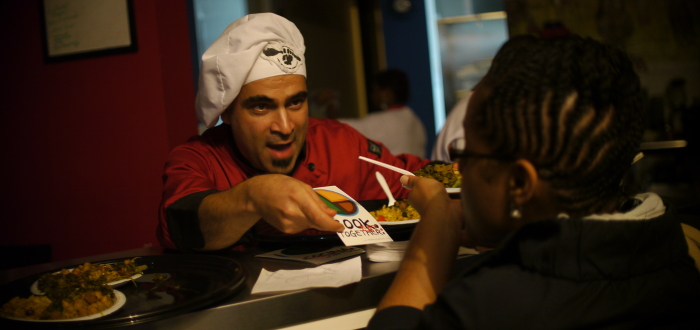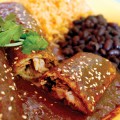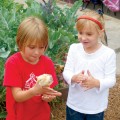We were eating lunch in La Piñeta, a hole-in-the-wall Mexican restaurant on S. First Street where Robert Karimi’s been eating for 15 years. Over nopalitos con huevos and sopes, Karimi explained the dynamic of his new show “Love, Food, Love” down the street at MACLA.
For the show, Karimi assumes his alter ego, Mero Cocinero Karimi, a.k.a. The People’s Cook. For Cocinero, cooking and eating together is a revolutionary act. In his eyes, people can do no wrong. I’d just asked him what, exactly, Mero Cocinero was all about. Turns out, it’s not really for Karimi. It’s for the audience.
“I tell people stories and they tell each other stories,” he said. “You wanna be a character for the night? You wanna tell a story? Go ahead, be who you are. Nobody tells an asparagus to be a beet.”
Karimi paused.
“That’s Mero Cocinero logic, by the way.” He laughed.
Karimi’s show allows space for stories, his own as well as the audience. For “Love, Food, Love” Karimi aims to get the audience involved entirely. “They’re gonna be cooking, they’re gonna be eating,” he told me. “I want everyone to have a good time nourishing themselves.” In addition to sharing stories, “Love, Food, Love” includes recipes and tips on eating better.
But when Karimi talks about nourishment, he doesn’t just mean the food. He’s a longtime performer, with stints in slam poetry, stand-up and performance art. He came to MACLA back in ’98 to do slam poetry, which is when he started eating late at night at La Piñeta. For him, art is nourishment just as much as food. And his characters and performance provide a currently very necessary venue for the audience to talk about food.
“How can we talk about difficult issues in our community in a delicious way?” is the question his show tries to answer. “I want people to make their well-being a community issue. Comedy and food are my vehicles,” he told me.
“Everyone’s culture has all the things it needs to keep it healthy.” He pointed to his sopes, rice and beans. “All the food in the Mexican diet is healthy. I will challenge nutritionists and doctors on that till the day I die.” He looked around the restaurant, pointing out the protein, starch and vegetables on the plates.
“But then we have to talk about portion and balance. How do we get balance back?”
His answer is pretty simple. The healthy/foodie/organic/local movement is great and all, but Karimi sees it getting a bit “precious.” It almost fetishizes food rather than valuing it. Instead, he wants to bring health and food down to earth. “Go eat with folks. Go ask mom. That’s what this show—experience, I mean—is trying to do.”
Toward the end of our meal, he pointed to the kitchen. “Did you notice when the waitress came over to ask us how our food was, the owner was watching. And when we said it was good, she nodded, and she was like, ‘Good, I did right by them.’” He laughed. “Like, what is that? Why do we do that?”
For Mero Cocinero—and for Karimi, too—it’s all tied together: food, love, community and well-being.

 SJ Q&A: Jay Meduri, Owner of Poor House Bistro
SJ Q&A: Jay Meduri, Owner of Poor House Bistro  Review: Sweet Rendezvous Runs the Desert Gamut
Review: Sweet Rendezvous Runs the Desert Gamut 


